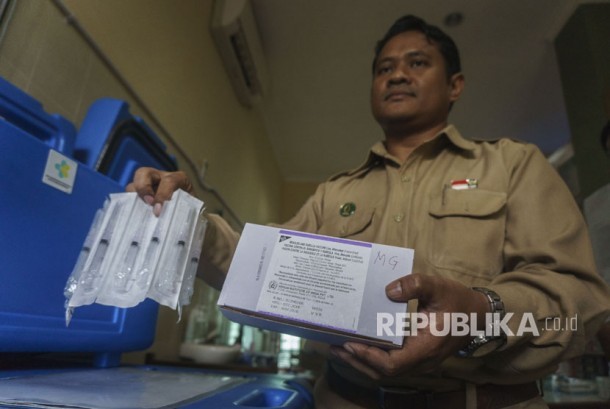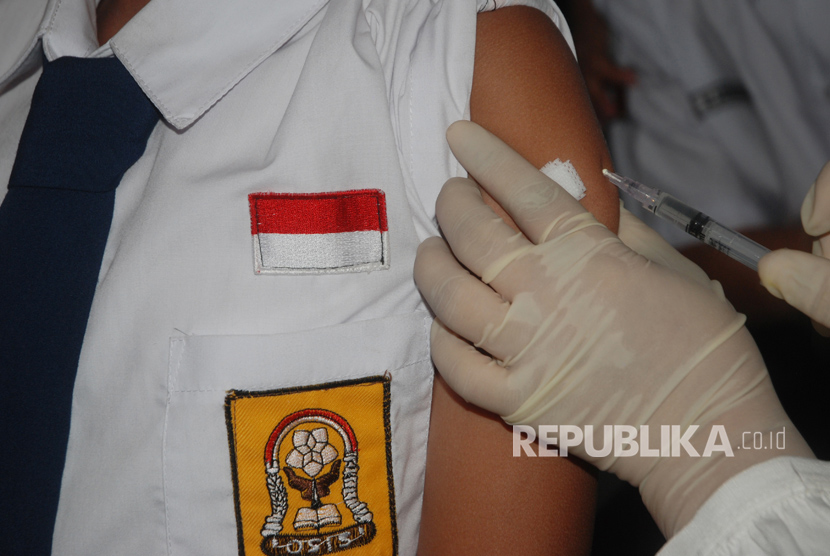REPUBLIKA.CO.ID, JAKARTA -- Fatwa Commission of the Indonesian Ulema Council (MUI) has stated the use of Measles Rubella (MR) vaccine produced by Serum Institute of India for national immunization campaign is permissible (mubah). The decision stipulated in Fatwa Number 33 Year 2018.
MUI admitted that MR vaccine manufactured by Serum Institute of India was made from religiously unclean substances, namely pig and its derivatives. It contained unlawful (haram) elements.
However, MUI did not ban the use of MR vaccine in mass immunization campaign in response to emergency circumstance. In this case, necessity overrules prohibitions.
"The use of MR vaccine product of Serum Institute of India is currently permissible or mubah because of emergency while halal-certified vaccine is not available," Chairman of MUI Fatwa Commission Prof Hasanuddin AF said to Republika.co.id at MUI office in Central Jakarta, on Monday (August 20) night.

Measles-Rubella vaccine manufactured by Serum Institute India was available at Mergangsan Health Center, Yogyakarta during the first phase of MR mass immunization campaign in August 2017.
On the other hand, MUI said the government is obliged to ensure the availability of halal-certified vaccines for Muslim community. MUI urged the government to maximize cooperation with World Health Organization (WHO) and Muslim-populated countries to provide halal-certified vaccines and drugs.
Meanwhile, vaccine manufacturers also were required to produce halal-certified vaccine as mandated in Law No. 33 of 2014 about halal products. "The government should take religious considerations as a guidance in immunization and medication," he said.
The use Serum Institute of India's MR vaccine would no longer be permissible (mubah) once halal-certified vaccine is available, Prof Hasanuddin said.
"Muslim community may take the benefit of MR vaccine to prevent greater harm caused by not being vaccinated," he remarked.
Health Minister Nila F Moeloek explained that measles and rubella are vaccine-preventable diseases. Once infected by MR viruses, the patient could not be treated. Morbilivirus that caused measles could trigger diarrhea with severe dehidration, encephalitis (inflammation of the brain), blindness, malnutrition to death in children.
From 2010 to 2015, it was estimated that there were 23,164 cases of measles and 30,463 cases of rubella in Indonesia. The real figure is expected to be higher as many cases were undocumented, especially in private hospitals and lack of surveillance reports.
"Surveillance data in the past five years showed that 70 percent of rubella cases occurred in group of age less than 15 years," Nila said on Monday.
Actually, the primary medical danger of rubella is not infection of children. Rubella--caused by infection of togavirus -- is a mild illness in children. However, it brought greater harm to pregnant women.
As rubella spread easily through direct contact with infected person's sneezes or coughs, it is important to continue vaccinating children to prevent the spread of infection to pregnant women. Therefore, the government run second phase of mass immunization campaign in 28 provinces outside Java Island in August 2018, targeting children from 9-months to 15-years old.
Rubella infection in the first three months of pregnancy could cause miscarriage. Other risk was congenital rubella syndrome in developing babies, including hearing loss or deafness, blindness, heart, brain, or nerve problems that might last a lifetime.
Previously, measles has been included in the national immunization program since 1982. However, after calculating the burden of rubella disease and paying attention to the availability of combined vaccine MR, the government decided to replace measles vaccine with combination of MR vaccine in mass immunization program. The fist phase was conducted in August 2017.
"Indonesian government committed to eliminate measles and control rubella/congenital rubella syndrome (CRS) in 2020," Nila said.


